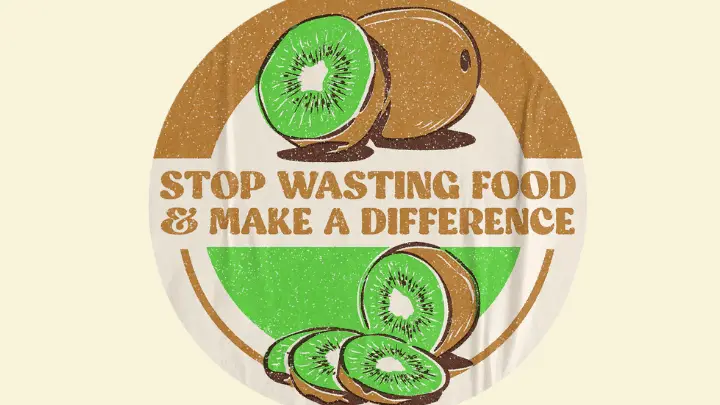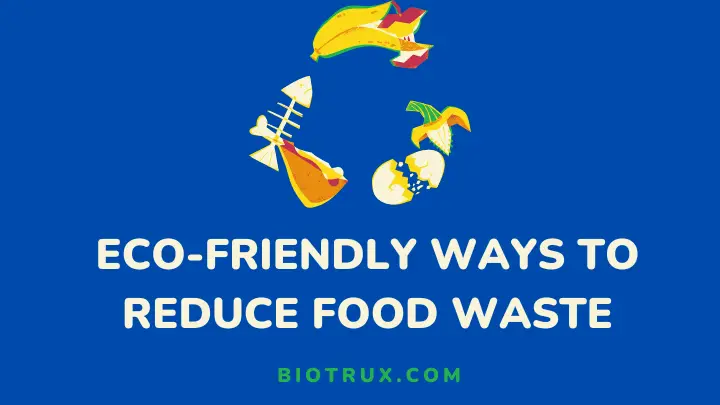Food waste is a global issue that not only affects our planet but also our wallets. According to the United Nations Food and Agriculture Organization, one-third of all food produced for human consumption is lost or wasted every year.
Not only does this waste contribute to greenhouse gas emissions, but it also wastes resources like water and energy and puts a strain on landfills. Fortunately, there are plenty of eco-friendly ways to reduce food waste, and many organizations, researchers, and companies are making great strides in this field.
In this article, I’ll highlight some of the current initiatives, research, and technologies that are helping to tackle this issue both on a large and small scale.
1. Food Waste Valorization
One of the latest eco-friendly food waste reduction innovations is food waste valorization. This is the process of using food waste as a resource to create valuable products, such as biofuels, fertilizers, and even food ingredients.
Food waste can be transformed into something useful instead of ending up in landfills and contributing to greenhouse gas emissions. Many companies and organizations are exploring this method to reduce waste, create sustainable products, and reduce their carbon footprint.
Utilizing food waste, valorization can create a more circular economy and reduce our environmental impact.
2. Food Waste Prevention Technologies
One of the latest trends to reduce food waste in an eco-friendly way is adopting cutting-edge technologies like smart sensors, artificial intelligence, and machine learning to monitor and optimize food storage conditions.
These advanced tools help minimize waste due to improper handling or storage, significantly reducing food loss and environmental impact. Some companies have even created smartphone apps that use AI to track food expiration dates and provide personalized recipes based on ingredients that need to be used up.
Investing in these food waste prevention technologies can help reduce food waste and efficiently use our precious resources.
3. Smart Food Packaging
Latest research and initiatives have shown that using technology to create packaging that can extend the shelf life of food can significantly reduce food waste. For instance, smart packaging can help monitor food’s freshness and extend perishable foods’ shelf life.
It can also control the amount of oxygen or moisture in the food, ensuring it lasts longer. Using such packaging, we can reduce the amount of food that goes to waste and, in turn, decrease the amount of greenhouse gases emitted from food waste.
Therefore, investing in smart food packaging is one of the most effective eco-friendly ways to reduce food waste.
4. Practice First-In, First-Out (FIFO)
Practice first-in, first-out (FIFO) as one of the eco-friendly ways to reduce food waste. This method involves organizing your fridge and pantry so that newly purchased or prepared food is placed at the back while older items are kept at the front.
This is a way to ensure you use the older products before they expire. This simple practice can help prevent food from going bad and being thrown away, ultimately reducing food waste.
FIFO is also a great way to save money, as you can use the food you already have before purchasing new items. It’s a win-win situation for both your wallet and the environment.
5. Surplus Food Redistribution Organizations
One of the most effective eco-friendly ways to reduce food waste is surplus food redistribution organizations. These organizations connect food suppliers who have surplus food with charities, shelters, and food banks that can distribute the food to those in need.
Through this process, decent food that would have otherwise gone to waste is repurposed and given to those who can benefit from it. Surplus food redistribution platforms are becoming more popular and accessible, with many companies and organizations working to make them more widespread and efficient.
This is a great way to make a positive impact on both the environment and society.
6. Food Waste-To-Energy Systems
Food waste-to-energy systems are gaining popularity as one of the most eco-friendly ways to reduce food waste. These systems work by converting food waste into energy through anaerobic digestion.
In this process, microorganisms break down the organic matter in food waste and produce biogas, which can be used as a fuel source for electricity or heat. This reduces food waste, provides a renewable energy source, and reduces the amount of waste going to landfills.
Several countries, such as Sweden, have implemented successful food waste-to-energy systems, and many others are following suit. Food waste-to-energy systems can reduce waste while creating sustainable energy sources.
The growing concern about food waste and its environmental impact makes them an attractive solution.
7. Farm-Level Waste Reduction Practices
Farm-level waste reduction practices are becoming increasingly important in the fight against food waste. One innovative approach is the use of imperfect produce. Farms are starting to harvest and sell produce that may have been rejected due to cosmetic imperfections or odd shapes.
This reduces waste at the farm level and provides affordable produce for consumers. Additionally, some farms are implementing regenerative agriculture techniques to minimize waste and increase productivity.
This involves using cover crops and rotating crops to replenish the soil and reduce the need for fertilizers and pesticides. Implementing eco-friendly practices at the farm level can greatly reduce food waste and contribute to a more sustainable food system.
8. Consumer Education Campaigns
Consumer education campaigns are one of the most effective eco-friendly ways to reduce food waste. Such campaigns involve educating the public on the importance of reducing food waste and how to do so.
By teaching consumers how to store and preserve food properly, they can minimize the amount of food in the garbage. Consumer education campaigns can also help people become more mindful of their food purchases, leading to more informed and efficient shopping.
In fact, a recent study showed that campaigns aimed at reducing food waste resulted in a 17% reduction in household food waste. With this in mind, we all must do our part to minimize food waste by being informed and proactive consumers.
9. Composting Food Scraps
Composting food scraps is one of the most eco-friendly ways to reduce food waste and promote a more sustainable lifestyle. Recent studies show that up to 40% of food produced in the United States is wasted, leading to environmental concerns and increased greenhouse gas emissions.
Composting food scraps is a natural and effective way to divert food waste from landfills and turn it into nutrient-rich soil for gardens and plants. It is an eco-friendly alternative to throwing away food scraps and a great way to reduce our carbon footprint.
Additionally, many cities offer composting programs or allow residents to set up their compost bins, making it easy for everyone to get involved and do their part in reducing food waste.
10. Plan Meals and Create Shopping Lists
Planning meals and creating shopping lists are two of the most effective eco-friendly ways to reduce food waste and promote eco-friendliness. When you plan your meals for the week ahead, you can ensure that you only buy what you need and avoid over-purchasing perishable items.
This not only helps to reduce food waste but also saves you money and time. Additionally, store your food appropriately to maximize its freshness and lifespan. This means using airtight containers, keeping produce in the fridge, and using freezer bags for items that can be frozen.
These simple steps can significantly reduce environmental impact while enjoying delicious, freshly-prepared meals daily.

FAQs
What are food waste tracking apps, and how do they work?
Food waste tracking apps are mobile applications that enable individuals and businesses to monitor and manage their food waste. These apps track data on food usage and expiration dates and suggest utilizing leftovers, helping users make informed decisions and minimize waste.
What role do policies and legislation play in reducing food waste?
Policies and legislation are crucial in reducing food waste by setting targets, incentivizing waste reduction practices, and encouraging transparency and reporting. Strong local, national, and international food waste policies can drive systemic change and promote sustainable practices.
How can you reduce food waste when dining out?
When dining out, start by ordering only what you can finish. Consider sharing a dish or taking leftovers home if the portions are too large. Be mindful of how much food you put on your plate and avoid excessive waste. Additionally, support restaurants and food establishments that prioritize sustainability and have initiatives to minimize food waste.
What are some eco-friendly ways to repurpose food scraps?
Vegetable scraps can be used to make homemade vegetable broth or added to a compost pile. Stale bread can be transformed into croutons or breadcrumbs. Fruit peels can be used to infuse water or make flavored vinegar. Get creative and explore various recipes and DIY projects that utilize food scraps.
Final Thoughts
Reducing food waste is a critical step towards creating a more sustainable future. With the help of current initiatives, research, and technologies, we can all contribute towards reducing food waste in our daily lives.
Several eco-friendly ways exist to reduce food waste, from composting to food sharing. Additionally, innovative technologies like smart food packaging and tracking apps are making it easier to keep track of our food and prevent it from going to waste.
By making conscious choices, we can all do our part to reduce food waste and protect the environment. So let’s take action today and reduce food waste to build a more sustainable tomorrow.
Learn more about ways to keep food warm without electricity.
Thanks for reading.

